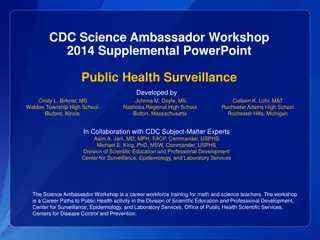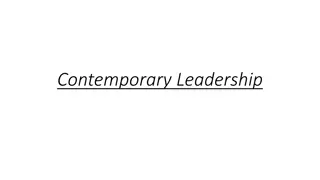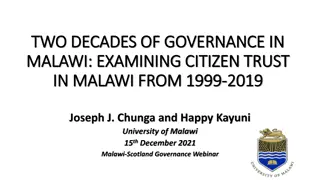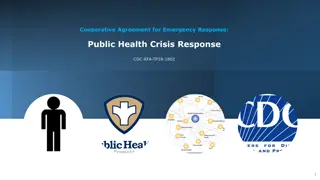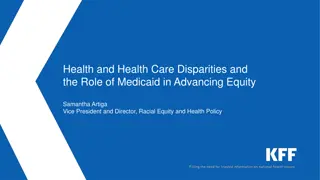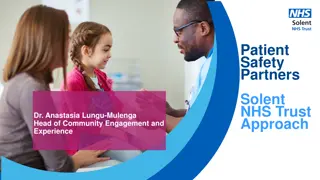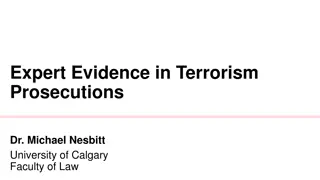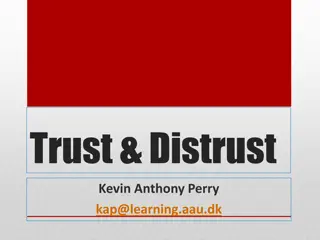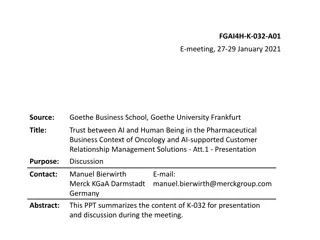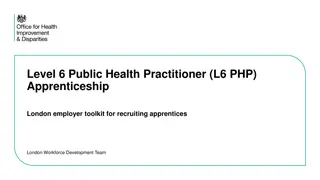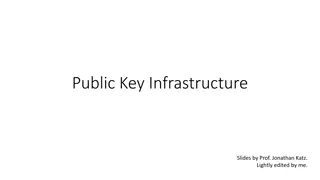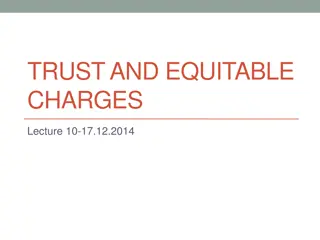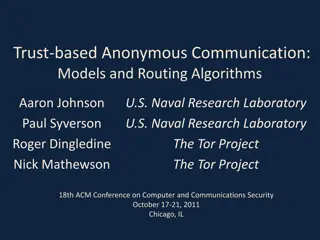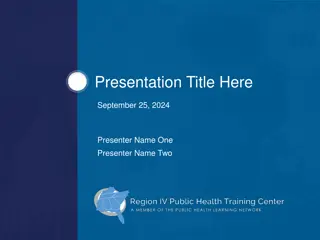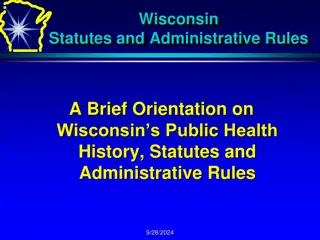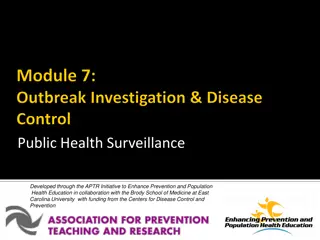Advancing Public Trust in Health Data: A Presentation to Experts
Presentation by Kim McGrail on advancing public trust, data literacy, and social license in health data strategy. Definitions of trust, data literacy, and social license are discussed. Acknowledgements and key findings on public involvement in health data research are highlighted. Valuable details for implementing a health data strategy are shared.
Download Presentation

Please find below an Image/Link to download the presentation.
The content on the website is provided AS IS for your information and personal use only. It may not be sold, licensed, or shared on other websites without obtaining consent from the author. Download presentation by click this link. If you encounter any issues during the download, it is possible that the publisher has removed the file from their server.
E N D
Presentation Transcript
Advancing public trust, data Advancing public trust, data literacy and social literacy and social licence licence Presentation to the Pan-Canadian Health Data Strategy Expert Advisory Group Kim McGrail, CEO and Scientific Director, Health Data Research Network Canada (HDRN Canada) 10 August 2022
Overview Definitions What we know and what we don t know A few additional notes Declarations: I am Scientific Director of PopData BC and HDRN Canada
Acknowledgements Funded by the Public Health Agency of Canada (and related to work of the Expert Advisory Group of the Pan-Canadian Health Data Strategy) Led by Alison Paprica, Julia Burt, Annabelle Cumyn and Roxanne Dault The project design was developed with the advice of the HDRN Canada Public Engagement Working Group 3
Some definitions Data trust: Trust in how data are collected, protected, disclosed and used (the objective) = social licence . [will return to data trust as a tactic] Trust: From Merriam-Webster: reliance on the character, ability, strength, or truth of someone or something . Trust is based on relationships and is ongoing. Trust (the noun) depends on trustworthiness (the behaviour) Data literacy: Understanding what data are and what they represent. If you take it literally, it s the ability to read and write data. (Data literacy applies to all stakeholders in the health space.) Social licence: Informal permission or agreement granted by stakeholders to organizations which are performing work that affects those stakeholders in some way
Some definitions (cont.) Public engagement and communication: This is a spectrum
What do we know already? Consensus statement on public involvement and engagement in data-intensive health research Systematic review of public responses to sharing and linking health data IPSOS-MORI One Way Mirror report Members of the public see health data as an asset that should be used for public benefit, but their support is conditional
This project adds Details that will be helpful to implement a health data strategy including: Experienced public and patient advisors views about some essential requirements for a use or user of health data to be within social licence; Specific examples of health data uses and users that participants agreed are within or outside of social licence; Non-majority views captured through the project s inclusive process (see Appendix) 7
Distilled requirements of the public categories and a few examples Benefits, e.g., Health data use, sharing, and re-use for public benefit is encouraged ( data aren t wasted ) Commercial organizations, e.g., There are additional safeguards, conditions, and protections when any commercial organization uses, shares, or re-uses health data Equity and Fairness, e.g., Health data are not used in ways that create stigma or discriminate against groups Governance and Oversight, e.g., The intended beneficiaries are involved in decisions about how health data are used, shared, or re-used Personal Control and Involvement, e.g., People (and caregivers that they authorize) can access health data compiled about them in a usable format (e.g., one that can be read by a computer or electronic device) Privacy and Security, e.g., Cybersecurity and other safeguards are in place to protect all health data, including de- identified data and anonymized data Transparency, e.g., There is transparent and plain language about when, how, why and with whom health data are used, shared, or re-used without the consent of the data subjects 8
Expansions / additions from patient and public advisors Full agreement on some examples of uses and users of health data that are within social licence: Health data used by healthcare practitioners to directly improve the healthcare decisions and services provided to a patient. Health data used by governments, health care facilities, or health system administrators to understand and improve health care and the health care system. Health data used by university-based researchers to understand the drivers of disease and wellbeing. No consensus on any examples of uses and users like: Companies using health data Uses of health data about systemically marginalized populations 9
Implications The boundary for health data social licence is jagged and varies depending on individual perspectives Expansive plans to increase access to health data uses and users are likely to be to be opposed by some groups, no matter what requirements and conditions are put in place. Participants provided information about what we might think of as the centre of social licence There are many public benefits that could be realized just by focusing on the participants three examples of uses/users with social licence including: better patient care, better health system planning, and better understanding of disease and wellness. These and other benefits could be realized if there is a concerted and continuous effort to identify and act on health data uses and users that members of the public support. 10
A few final notes Data literacy is an independent / separate activity ( data literacy does not equal data trust ) On public engagement - not a binary choice. Need different tools for different goals. Social licence and the conditions for it can and do evolve. And a commitment to public engagement may make things messier in the short-run Models for ongoing involvement are increasing. Deliberation events / citizen juries Public assemblies
Thank you Thank you ID: Decorative image of a stylized map of Canada with a photo of mountains in the background 12
Process We used our networks to invite experienced patient and public advisors to apply, and selected 20 participants (10 English, 10 French) such that we had the most diversity of perspectives. Our first task was to co-develop a list of essential requirements that must be in place for health data uses and users to be within social licence. Each participant worked individually, then participated in two sets of group discussions. Group discussions were facilitated by HDRN Canada and GRIIS project team members and conducted either in English or French, depending on the first language of the participants. After hours of discussion and weeks of reflection, a list of 40 requirements initially proposed by the project team increased to 85 requirements to reflect the many differing views of participants. In several cases, the differences between requirements were small, but seen as meaningful distinctions by participants. Once the list of requirements was updated to include participant views, the next task was to review specific examples of health data uses/users, and assess whether those examples are within or outside of health data social licence. The entire process followed inclusive design principles which explicitly acknowledge that people who hold minority views are the ones who are least likely to be well served by the status quo and are often the holders of knowledge that is essential to design processes, policies and products that work for the entire population, not just the majority 13





